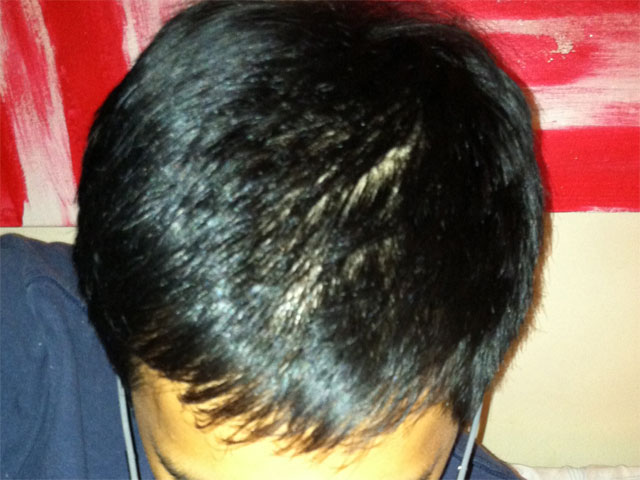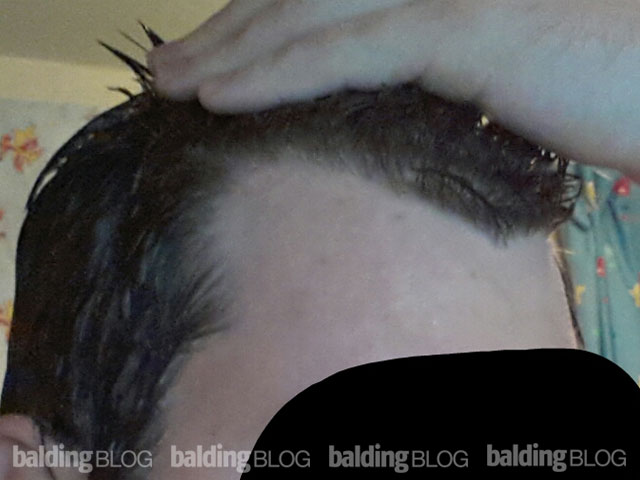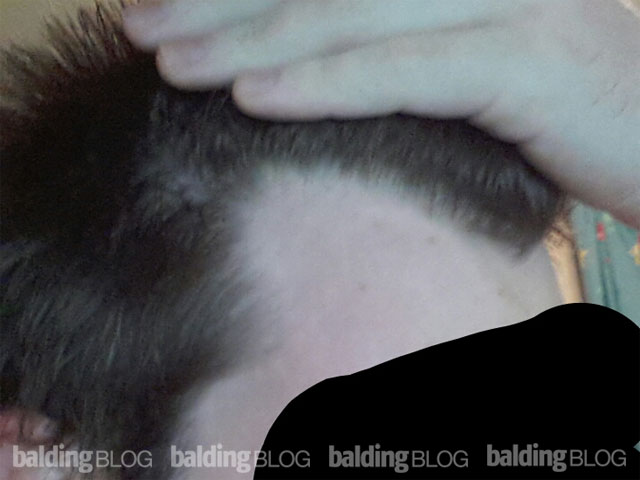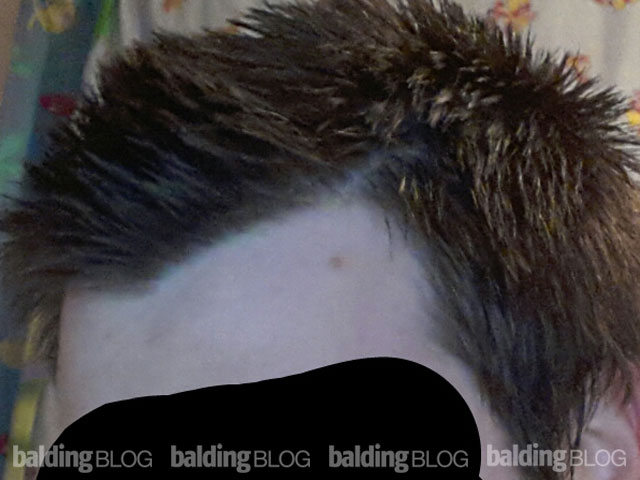We’re off today and tomorrow, but we’ll be back on Wednesday.

We’re off today and tomorrow, but we’ll be back on Wednesday.

Hi Dr. Rassman et al.!
I am a 22-year-old Caucasian male with blond hair, a NW2 hairline and somewhat low hair density. I’m not worried about my hairline, but my low density bothers me.
Here’s the thing: I have hydrocephalus, and with it an abnormally large head circumference. I’ve always had thin hair, but I shaved my head for the first time the other day and the density really scared me. Given my history of thin hair, is it possible that my low density is due to my scalp being “stretched” and causing the follicles to spread apart? The hair at the back of my head is slightly denser than at the top, but it’s very fine and light-colored. I know this is an unusual question and I understand if you can’t offer any answers.
Thanks for your time and all the advice you give!
I suppose if you start with a normal scalp hair number (100,000 hairs), but with a large head circumference (large area), you would have a lower hair density (hair numbers per unit area). But for those with normal head circumference, you can still have low hair density because some of us can be born with low hair numbers. It’s just the way we are different.
Hair color and skin color can also contribute to the perception of hair density or fullness. High contrast (dark hair / light skin) can be perceived as a lower density than low contrast (light hair / light skin). Hair length can also change the perception, as longer hair looks more full than shorter hair.
Finally, hair style can be a factor, as well. Curly hair looks more full than straight hair. These factors may be common sense, but it all plays a factor in how one perceives density and fullness of hair.
If you were to visit us, we could measure your hair density in different parts of your head, compare one part with another and give you an assessment of your total hair count and any differences that are area dependent.
Dr Rassman
Assume one has a successful transplant. Is it possible for some of the yielded grafts to die or be rejected some time (even years) after the operation? I am not talking about hair loss, nor about grafts that are genetically doomed. I am talking about healthy grafts, from a safe zone, that are transplanted and bloom normally but after some time die. If it is possible what would the chances be and why would it happen?
If the transplanted hair grafts have successfully taken and have grown hair, they should last as long as the hairs from the donor area. Over many years some donor hairs may eventually fall out and die (senile alopecia) or experience a temporary hair loss (telogen effluvium/ stress related hair loss). If something like that would occur, then the transplanted hair will experience this same fate.
With respect to graft rejection, it is highly unlikely to happen since the transplanted hairs are your own (autologous graft). Your body will not reject the material from your own body in normal circumstances. Over the past 22 years, I have seen a few patients that reported loss of donor hair at about 5 years post transplant. I have no explanation for this, but the incidence is far less than 1% in my estimate.
Hi Dr. Rassman,
I am 19 years old and have been on Proscar for the last year. My hair loss has begun quite slowly but it is somewhat noticeable around the temple area. Obviously it is hard to tell just how much hair I have saved or whether it has slowed the progression at all. However, in the past few weeks I have altered my dosage and believe it has caused a slight increase in hair loss.Originally my doctor suggested a 5mg pill cut in half and taken every second day, but after reading your answers here about how long the pill lasts in the system I reassessed with the doctor and decided on a 5mg pill cut into four and taken every day. Seeing as this only changed three weeks ago, do you think it is purely coincidental?
If there is one thing I want all readers to understand it’s that you need to establish a relationship with YOUR doctor, and obtain and resolve your medical issues with them. I’m glad you talked to your doctor before changing the dosing, but if you do have issues you should contact that doctor for his/her take on it.
In general, Propecia (finasteride 1mg) taken every day is used for the treatment of androgenic alopecia (genetic male pattern hair loss). Many men cut the generic finasteride 5mg into four parts (since cutting it in 5 equal pieces is very difficult). Other doctors may have their own opinion and treatment regimen, but the recommended dose is finasteride 1mg taken every day.
Finally, it takes several months before you see any effects (benefits) from finasteride. I occasionally read emails and comments where someone notices some change in their hair (loss or gain) after several days or weeks, but that is unlikely. So what you’re seeing may just be coincidental.
It’s the holiday season, so we’re not going to post today or tomorrow like we would normally do. We’ll still post a few times this week, and things will pick back up to the normal amount of posts on January 2nd.
Happy Holidays!
Hi! I’m 22 years old and am about to turn 23 and am very concerned about some hair loss/balding. What is most frightening is how sudden this is. Is all hair loss a sign of balding or can hair loss happen suddenly due to external factors?
While doing research on balding, I saw the pattern charts. I don’t seem to be following any pattern, but the thinning of my hair is certainly noticeable to me. My friends don’t see it yet, but I can at least style it for now to hide any thinning.
I’m seeing thinning at the top of my head… My hairlines have NOT receded and I am not experiencing any loss of hair on the sides. Do you have a guess as to what pattern this could be? Do you think it’s balding or temporary? Is there anything I can do to slow or stop it?
22 seems like a really young age to lose hair :/ especially for someone who aspires to work in the entertainment industry..
Thanks for any help or advice
Click the photo to enlarge.

We generally think that men recede front to back and with the presentations of the Norwood classifications these seems to be the case; however, I do see people maintain strong frontal hairlines and lose hair behind it. This is why when we examine a patient we test for hair bulk behind the hairline and in the crown. Often, to my surprise, I see loss of bulk in the top and/or in the crown, even when it does not appear deficient with my naked eye.
If you take a person with medium weight dark brown or black hair that has a loss of 50% of the hairs in the top and crown, you likely will not be able to tell that there is hair loss. If the bulk analysis shows hair loss in the top and crown, that is a good reason for taking finasteride and it will often control it. By taking two measurements about a year apart, you will know for sure if the hair loss continues, is stabilized, or if it reverses.
At 22 years old, it isn’t abnormal to see hair loss if you have the genetics for it. But I don’t have any idea if this is genetic balding, disease, diet, stress, etc. You need to have an examination to hopefully determine what is going on with your loss and try to get it under control. Knowing what is going on allows you to be proactive in what happens to you.
I got two questions linked to finasteride and side effects:
1. Why does testicular pain occur when taking finasteride?
I’ve read somewhere that the testicle is working overtime to produce more testosterone as it senses that DHT is low and is trying to compensate. I don’t know if this is true or not, but is there any “official” explanation?
2. Is there any connection between finasteride and penile shrinkage?
You should not have testicular pain when taking any medication, including Propecia / finasteride. If you have testicular pain it may be a serious medical emergency. I believe it was less than 1% that had this side effect in the clinical trials, so it is quite rare. I don’t have a reason for why it could occur at all, though.
I would strongly advise you to follow up with your doctor. What you read on the Internet (and even BaldingBlog) does not substitute for a face-to-face personal relationship with your physician, and that includes exploring the cause of your testicular pain. Finally, finasteride do not cause penile shrinkage.
Hello Dr.
I’ve have eczema on my forehead and cheeks, i’m using miconazol/hydrocortison twice a day for ten days now.
Because i’ve to put it on my forehead, close to my hairline when i wake up and going to sleep, could it speed up my hairloss? It’s also on my cheeks so if it comes on my pillow is it dangerous for my hair?
Thank you
Please use medication as directed by your physician. Hydrocortisone can be absorbed by the body and can contribute to hair loss if it is used in excess. Very small amounts work well for its primary purpose.
Hi,
About a year and a half ago I went on a diet and lost over 100 lbs during the course of a year. After about 6 months my hair started to thin out all over my head. I got nervous and started taking a multi-vitamin and a vitamin for healthy hair. Most of the hair I lost gradually returned but it was much darker and thicker. My natural color is light brown/blonde. The hair that grew back had a straw like texture. It was black and wiry.
I visited my family doc and a derm and both said the color change and thickening was odd. They did a full battery of blood work but it showed nothing. Now after about six to eight months of having alien hair the dark, thick, black hairs are shedding like crazy. 90% are gone at this point. What is left is the hair that is my natural color and texture. It is much thinner than usual because of the shed the past few months. I can see some light colored peach fuzz sprouting up where the dark hair fell out but that just started in the last two weeks. Luckily, I had super healthy, thick hair before this so if I style it correctly I still have coverage.
When it turned black friends asked if I colored my hair. Now that it is going back, I’m getting the same question. Docs suggested hormones. I did have a stressful year and a half. They said I could use rogaine or propecia. I didnt want to start either of those because from what I read they need to be continued for life. Very nervous about propecia especially if my hormones were out of whack naturally and have recently returned to normal on their own. I doubt that would help make things better. No doctor would say for sure it is MBP, not even a local hair transplant doc I went to a consult with. He said give it 6 months and come back. He never saw hair get thicker and black before and couldnt explain it.
Everything I’ve read about MBP talks about receding and gradual thinning. My hair went from perfect with no signs of loss or family history on either side to thin to thicker and black back and now to normal color but thin in just over a year and a half. I do not have any bald spots just my normal hairline of the past but a general lack of density because of what I lost. I’m frustrated and out of options as far as I know. I’m hoping you could offer some insight. I just want to know what I’m dealing with so I can decide on a course of action. Thanks in advance for your help.
Hair color change and texture change are not likely related to dieting, but perhaps your hair loss was “triggered” by the extreme dieting (a common condition). I can’t explain the reason for the wiry, black hairs that you’re describing. It is a little odd, and I’m sorry to say that I don’t have any further insight.
Diffuse hair loss and patterned hair loss are generally two different things. For example, if your hair loss is deemed to be telogen effluvium, then your hair will likely grow back in a year. If you have another exam (find another doctor that can give you answers after an in-person examination) and can get the MPB diagnosis, then medication like Rogaine or Propecia would be helpful. If you don’t have genetic male pattern baldness, Propecia isn’t going to help you.
You need to figure out what is going on before you can figure out how to treat it.
Snippet from the non-hair-loss article:
Her eyelid drooped stubbornly, and the area around her eye was somewhat swollen. Six and a half hours of surgery later, he and his colleagues had dug out small chunks of bone from the woman’s eyelid and tissue surrounding her eye, which was scratched but largely intact. The clicks she heard were the bone fragments grinding against one another.
About three months earlier the woman had opted for a relatively new kind of cosmetic procedure at a different clinic in Beverly Hills—a face-lift that made use of her own adult stem cells. First, cosmetic surgeons had removed some the woman’s abdominal fat with liposuction and isolated the adult stem cells within—a family of cells that can make many copies of themselves in an immature state and can develop into several different kinds of mature tissue.
Read the full article — In the Flesh: The Embedded Dangers of Untested Stem Cell Cosmetics
Yikes. The article goes on to discuss possible dangers of unapproved stem cell treatments and how we should temper our excitement for these types of treatments so that serious illness research isn’t put in jeopardy.
Hi,
I am having a hair transplant surgery by the FUE method and I am aware that I should not take aspirin 7 days prior to my transplant, but I completely forgot the 7 day rule and by the time my surgery comes up it will be only 5 days since stopping my baby (low dose) aspirin use. Is this going to affect the outcome of my surgery or during surgery due to bleeding? Is 5 days time for stopping my aspirin use enough time to have my surgery without worrying about it? I am a little concerned and blame myself for not stopping it a little sooner.Please let me know if OK. Thank you kindly.
Excessive bleeding is always a risk in surgery when the patient is on a medication that can cause major bleeding (such as aspirin). Your surgeon should be made aware and you should discuss your risks with him/her.
hey doctor. I’m just wondering if I have a mature hairline or is it more? my hairline has certainly changed from when I was 18. also I cannot understand why one side seems to be receding more than the other and has been for years! I have naturally thin hair.I have attached a picture that tracks my right side for over 2 years. a recent picture with my hair wet and also with a styling product in and then the left side which does not seem to change. you can use this for you site if you like.
Thanks for allowing us to publish your photos. I didn’t use all of them, but I think our readers will get the idea. Click them to enlarge.



Some men do not bald symmetrically, and in your case, that seems to be what is happening. The left side appears to be a mature hairline and the right side appears to be beyond just the mature stage. Propecia is a good drug to help slow down the process, though I wouldn’t expect regrowth there necessarily.
Since you indicated that you’re in the UK, I would suggest visiting a specialist like Dr. Bessam Farjo with offices in London and Manchester, so you can get an expert opinion on your hair loss situation.
I’ve been taking Propecia for almost a year now and don’t think I’ve seen any more loss but I’m curious about taking Propecia whilst drinking heavily. I drink every night due to a stressful job and also entertain clients. I am looking into cutting down but due to the nature of my work, it’s not always possible.
If I am taking Propecia whilst drinking a lot, is there a better time of the day for me to take it? If I take it in the morning before work after a night of drinking, will my body process it like normal?
You know this already, but you should cut down or stop your excessive drinking. Taking Propecia is not related nor interferes with alcohol intake.
However, if you develop liver disease from the excessive alcohol, this could negatively impact the metabolism of Propecia. But if it got that far, hair loss shouldn’t be your number one priority anyway.
Are people with certain hair colours more likely to go grey as they age? I notice a lot of people with salt and pepper coloured hair but I can’t think of anyone I’ve seen with that level of brown and grey hair, or red and grey hair etc.
All hair colors would generally grey as the person ages. The degree of greying and how fast the person goes grey is dependent on their genetic predisposition. I am not aware if there is a correlation with hair color and going greying.
Had a slight thinning of hairline and a diffuse shed since starting an ssri. i have heard this is due to high prolactin caused by the ssri medication. could the thinning/receding hairline be the result of the medication?
While some medications can cause hair loss, medication is generally the last consideration among the list of other causes of hair loss. You may just have genetic hair loss that can cause thinning in the hairline. There is a reason why we call it male pattern baldness. Genetic balding has a pattern to it — like a receding hairline.
It’s even possible that you have a combination of things going on, with your genetics causing your hairline recession and the SSRI causing a diffuse shed elsewhere on your scalp. Many SSRIs are known to have hair loss as a rare side effect, but you really need to speak to your prescribing doctor about the medication and any issues you may be having because of it. I’ve written about this before here.
I simply don’t know enough about your case history, including your age, how long you’ve been taking the SSRI, family history of hair loss, etc.
